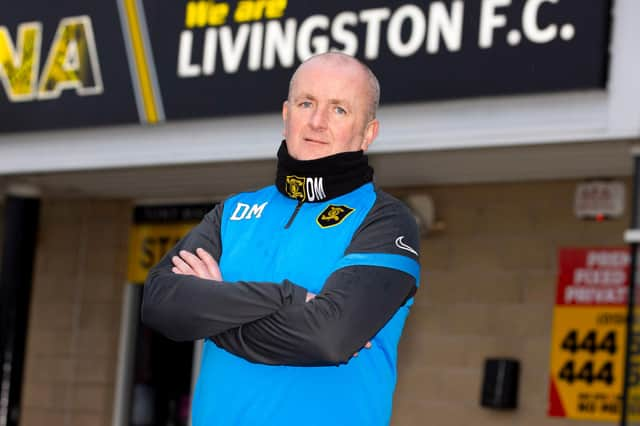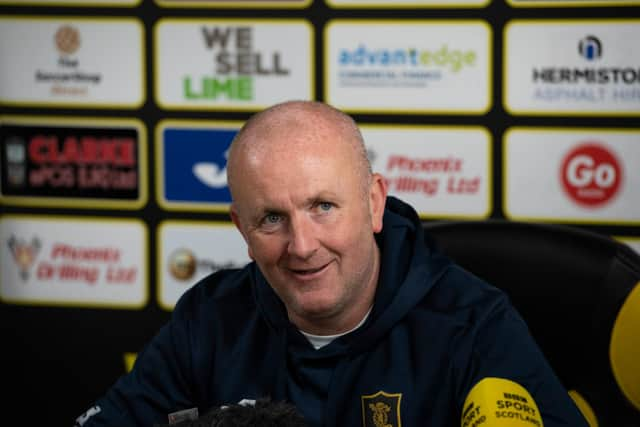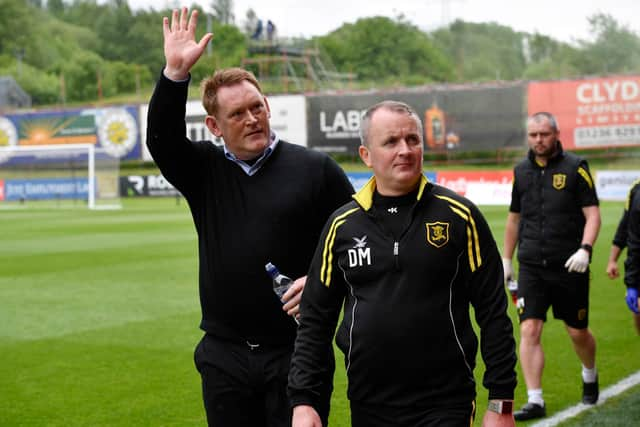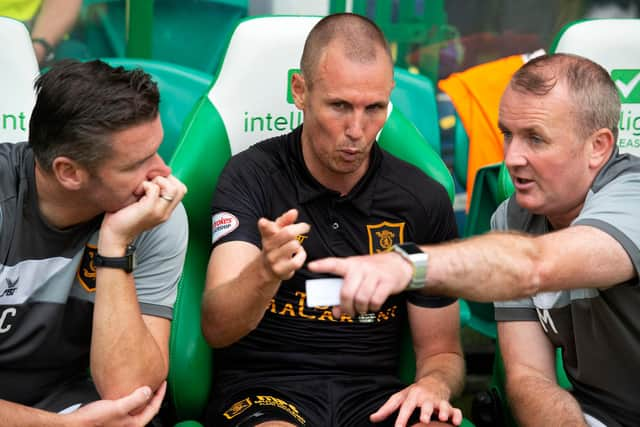From Rangers rejection to prison and redemption at Livingston - David Martindale on the 'power of football' after stepping out from behind the curtain


Because unlike many of his managerial contemporaries, his life has not followed the same straight path through club youth set-ups and academies and on into a professional playing career. He didn’t play at the top level before taking the sidestep into coaching and management. Instead, as a kid he didn’t apply himself the way he should have when on the books of Motherwell and Rangers and was released from his Ibrox contract when he broke his leg in an unauthorised match with mates.
“Actions have consequences,” he says. “I speak to the boys about how quickly their lives can change, about how I never thought about that when I was younger. I sound like an old man saying that but I think it’s important to speak to the boys about that.”
Advertisement
Hide AdAdvertisement
Hide AdOf course, he is talking about more than an unsanctioned kickabout costing him his Rangers career.


Which takes us back to that background role and his reluctance to do anything that would see his past - one that involved organised crime and a six and a half years prison sentence, which he served just over half of - plastered over newspapers or trending on social media.
Aware of the toll that spell had taken on those he loved, he didn’t want his family exposed to it all again. Or, in the case of his young daughter, Georgia, introduced to it in a way he feared neither he nor his wife Martha would be able to control.
“I had been offered the job two or three times before I finally took it but I didn’t believe in my skillset or that I was ready but I also didn’t want the negative publicity that I knew would come with that. Up til then I’d managed to go under the radar. There had been one or two wee things in the local paper but I don’t think I was prepared for getting into the Premier League and the media side of that.”
Foot in the door


In 2014, 10 years after his arrest, eight years after he was locked up, four years after his release and two years after he had completed a degree in construction project management at Heriot-Watt University, the former junior player who had coached at Broxburn United following his release from prison, was given a chance at Livingston.
Under manager John McGlynn, he volunteered, picking up cones, handing out bibs, and collecting balls. It was a foot in the door but little more.
When McGlynn moved on Mark Burchill allowed Martindale greater involvement and when he was replaced by David Hopkin, the new boss elevated him to assistant manager, with responsibility for recruitment. By then he enjoyed real sway.
That did not sit well with Kenny Miller during his short spell as player/manager. “I was offered the job after Hoppy left but at that time I was probably still too hung up on the fact I had never managed or played in the premier league,” explains Martindale. “That’s why Kenny came in originally. But he struggled with the dynamics and it just never worked.”
Advertisement
Hide AdAdvertisement
Hide Ad

Having earned back to back promotions, the club had returned to the top flight by then and Martindale believed he could continue to avoid publicity.
“I thought it would be much of a muchness. And it might have been if Kenny had stayed but there were so many conspiracy theories and it was a Martindale this and Martindale that.”
Even though Holty [Gary Holt] took the manager’s job, with Martindale officially described as the head of football operations, there was no more hiding.
“So, although one of the reasons I never took the job was the media side of it, it all happened anyway.”


He was also forced to have the conversation with his daughter - she, thankfully, was nonplussed - and to reassess his goals, and when he eventually succeeded Holt midway through last season, he was required to go through the SFA fit and proper person process.
But, the 47 year-old admits there was a sense of relief that the secret was out, while fears over his ability to do the job were assuaged by the unbeaten run that catapulted the team up the table.
“When Holty had come in. I obviously had a massive say in what happened day to day. We worked well together, but it was my concepts and Holty was a cog in the wheel so I started wondering what I’d been worried about. Everything we were doing was working.
“I’ll be honest, that 14-game unbeaten run we went on, that wasn’t just Davie Martindale, that was the process and maybe Holty leaving gave the boys a shock to the system but I do believe our season would have changed eventually anyway.”
Advertisement
Hide AdAdvertisement
Hide AdFrom prison to Parkhead
Sitting down with Martindale, as he looks ahead to the latest meeting with Celtic, a team he has a strong record against, taking points from them in 60 per cent of their meetings since moving out of the shadows in 2018, the plan wasn’t to discuss his past - his time in prison has commandeered plenty of column inches already and he is fascinating enough not to need that to colour his conversations - but given its bearing on his life and the openness with which the Livingston manager approaches every interaction, it is not that surprising that the subject forces its way to the forefront of the conversation at times.


“It has given me a different skill set. I’ve been asked ‘when you look back would you change your life?’ and that’s a big question. I know that seems absolutely terrible because that period of my life and the impact I had on my son, my wife, my mum and my dad is horrific. It was them I really hurt. So in one respect I would love to change it because of that but in another respect it has got me where I am today it has made me the person I am today and I remember speaking to the boys after Holty [Gary Holt] had just left and saying ‘10 years ago I was coming out of prison and six or seven years later I was going to Parkhead to play against Brendan Rodgers! It shows them the power of football and what they can do.”
It has reinforced the view that things are rarely back and white, in fact, according to a psychological test he has used, he is a fiery red, a leader. Being behind bars has also fine-tuned his interpersonal skills, given him time to “think and reset” and fine-tuned his intuition.
“I lived on my intuition for three and a half years and it’s something that comes out of there with you. Because of that, as a manager I am not psychic but I can generally call things before they happen. I will say ‘he’s going to another club’ and when I get him into the office he will ask ‘how did you know that?’.
“It’s the little changes in behaviour or body language or the fact he suddenly won’t look me in the eye. Sometimes you don’t even really see it, you feel it.”
Obviously rehabilitated and more honest in some aspects of his day to day life, he says he was always quite pragmatic. “I was always a very honest person in a lot of ways. I know that sounds strange because I have been to prison - a social worker back then told me I had flexible morals - but I think the boys appreciate that I don’t talk crap to them.
“We make big demands and it is sink or swim, but I always tell them that if they think they are sinking, let me know. I will try to help them. They might not play for Livingston but I will try to help.”
Bringing in a psychologist to work with him, he has identified the different ways to coach. Some players respond better to hands-on coaching, others, who tend to have spent so much time on phones or screens, benefit from visual learning. Others, although they usually hate it, thrive when they are made to take written notes.
Advertisement
Hide AdAdvertisement
Hide Ad“Some of them think it’s crazy but I don’t understand why they are so resistant. It is either because it was not what they did in the academies - I think the academies in Scotland are so far from where they need to be it’s incredible - or because they think their mates will laugh at them. None of those things should be an issue but the way things are going, we are processing footballers who are all very, very similar. Let me ask you, does Paul Gascoigne succeed now or does he get pushed out because he’s running around not listening or pulling peoples pants down? I say he doesn’t make it because there is so much over coaching in football now.
“That’s why we don’t have as many individuals.”
Back in 2006, he pled guilty to his crimes and accepted the punishment. These days he is just as willing to hold his hands up when it comes to an error in tactics, a wrong choice of substitution, or acknowledging his side were lucky to escape with any points or survive a penalty claim against them. In drawing with today’s opponents at Celtic Park last season, he celebrated the achievement but was willing to recognise they were up against a depleted team.
“I think some people are still surprised when I come out with stuff like that but I don’t know what they expect me to say. I know there are dishonest people in football, people I wouldn’t give the time of day. But I do believe in taking responsibility.”
No safety net
Rewind to November 2020, when Martindale finally, officially, assumed the manager’s role. There was a collective holding of the breath at a club that is seriously tight knit. No-one knew how the situation would play out. Other managers had found it tough to escape their past, while, more recently, some had struggled to overcome their lack of top level playing experience and reliance on a more academic approach. As someone with a criminal record and a university degree, Martindale was understandably wary.
“It was hard at the start but we went on that 14 game unbeaten run and I think the media was very positive about David Martindale. If we had only won four, lost a couple, drawn the rest, would there have been the same positivity?
“I know football is not as working class as it used to be but so many boys in the changing room or people in the stands have a dad or a brother or somebody in the family who you would be very, very surprised about so they could maybe relate to that part of me more than the part that had been to university.
“But they gave me time before they judged and I think the wins and my honesty helped.”
Football’s hunger for a fairytale, where the underdogs triumph, also played its part.
Advertisement
Hide AdAdvertisement
Hide AdMartindale is imbued with humility and empathy, a willingness to admit his flaws as well as his drive for self-improvement as a man and a manager.
Born in Govan, he has followed Sir Alex Ferguson’s career but does not have the support network in the game that most of his peers enjoy.
“A lot of managers have come up through the game then stepped straight into coaching. They have not been out in the real world but they can phone their previous managers for help or advice and suddenly they are almost a clone of them. I don’t have that but I think that’s a positive. Maybe that’s why I second guess myself. I don’t have that safety net so you have to work harder to find ways to make it work.”
He has helped guide a club with one of the smallest budgets through promotions and cup journeys, earning their place in last season’s League Cup final and the Premiership top six. The man who enjoys a bit of online stocks and shares, has wheeled and dealed, bringing in money for the likes of Lyndon Dykes to keep things ticking over throughout a pandemic that has already cost the club hundreds of thousands of pounds in lost gate receipts and made it necessary to engorge the squad to cope with periods of self-isolation.
The early season results have not been brilliant but he has retained perspective, given the level of opposition and believes the victories will come again. But, for all he has worked to turnaround fortunes, the club’s and his own, enjoying it all can be hard.
“I remember Scott Parker when Fulham went up, he was saying exactly what I was feeling. You really don’t get a chance to enjoy a season or winning a game of football. We could go out and beat Celtic and you’re euphoric for 15 minutes in the changing room but by the time I get home, get a coffee and a bit of chocolate, I will already be thinking about Rangers on Wednesday.”
In front of or behind the curtain, there is no hiding from the pressure he puts on himself.
Get a year of unlimited access to all The Scotsman's sport coverage without the need for a full subscription. Expert analysis of the biggest games, exclusive interviews, live blogs, transfer news and 70 per cent fewer ads on Scotsman.com - all for less than £1 a week. Subscribe to us today
Comments
Want to join the conversation? Please or to comment on this article.